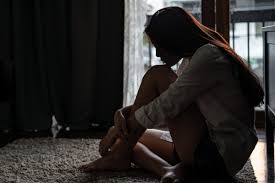
Indian women seek to criminalise marital rape
Raped by her husband on her wedding night when she was seventeen, Divya detailed her ongoing misery, an all too familiar story in India made possible by a horrifying legal loophole from the colonial era.
Divya, 19, said, "I told him I have never had sex, and asked him if we can take it slowly and try to understand it."
"No, the first night is very important for us men," he responded.
Then he gave her a harsh slap, tore off her clothes, and pressed himself against her.
Her 2022 planned wedding was followed by 19 months of physical and sexual torment.
"If I was injured, he couldn't see it," Divya, whose identity has been concealed, claimed.
"He used to brutally have sex with me."
The most recent National Family Health Survey from the government indicates that 6% of married women between the ages of 18 and 49 report experiencing spousal sexual abuse.
That suggests that over 10 million women in the most populous nation on earth have suffered sexual abuse at the hands of their spouses.
According to the health survey, almost 18% of married women believe they are unable to refuse their spouses' requests for sex.
Additionally, 11% of women believed that a husband had the right to beat his wife if she refused.
a "Victorian mindset"
A provision exempting "sexual acts by a man with his wife, the wife not being under fifteen years of age, from rape" was found in India's penal code, which was carried over from the British.
The exception clause is still in place despite India's new penal code, which went into effect on Monday and raised the age at which a man can rape his wife to 18.
Karuna Nundy, an attorney, is contesting that.
Nundy denounced the clause as "colonialism from a Victorian mentality" in her Supreme Court case on behalf of the All India Democratic Women's Association rights group.
She mentions a few of the more than 50 countries that have banned it and expresses her "fervent hope" for change.
This year, Chief Justice D. Y. Chandrachud referred to it as a "important issue."
However, the ten-year case has advanced at an excruciatingly glacial pace.
A divided decision was rendered by a Delhi High Court two-judge panel in May 2022.
While "one may disapprove" of a husband forcing sex with his wife, it "cannot be equated with the act of ravishing by a stranger," according to one judge, C. Hari Shankar.
Rajiv Shakdher, the other judge, wasn't convinced.
In reference to the statute from the British era, Shakdher stated that it "would be tragic if a married woman's call for justice is not heard even after 162 years."
Marriage should not be a defence against crime, according to Monika Tiwary of the rights organisation Shakti Shalini, which assists victims of sexual assault.
She questioned, "How can marriage alter the meaning of rape?"
"Your right to control your body does not change when you get married."
arranged unions
The majority of sufferers do not truly comprehend that it is improper and that it is a marital rape,” Tiwary added.
“The moment we label it and attach a law to it, people start recognising it, awareness increases”, Tiway added.
Like many marriages in India, Divya's was arranged.
However, the spouse used the fact that her family had not given him the customary sizable cash dowry against her.
"It's not like your parents gave any dowry, I can at least do this," Divya recalled him taunting her.
He would occasionally put a knife to my throat and challenge me to refuse. "You are my wife, and I have full rights over you," he would add.
The mother of two, Swati Sharma, 24, said that she wed a man out of love.
After the birth of their first daughter, her husband attacked her for the first time.
"Alright, we're married, we can handle this," she recalled thinking.
threats of death
He would vent his anger on her when he was upset. He accused her of having an affair if she declined to have sex.
The turning point occurred when he undressed her in front of their kids while watching them fall asleep.
She continued, "Then he went on to have sex with me." "He stayed with me until he got what he wanted."
She took her kids, packed her luggage, and headed off.
However, some women return to violent spouses in spite of the abuse because they are under tremendous societal pressure and worry for their children.
Sharma also went back to her husband, who encouraged her to return after attending counselling.
Despite her escape, Divya is still afraid.
Threatening that he "will not let her live," her husband sent her mother a note.
However, she claims to be "proud" of her departure.
"This still happens to a lot of girls, every day and night," the speaker stated.
"Such men need to face consequences."





